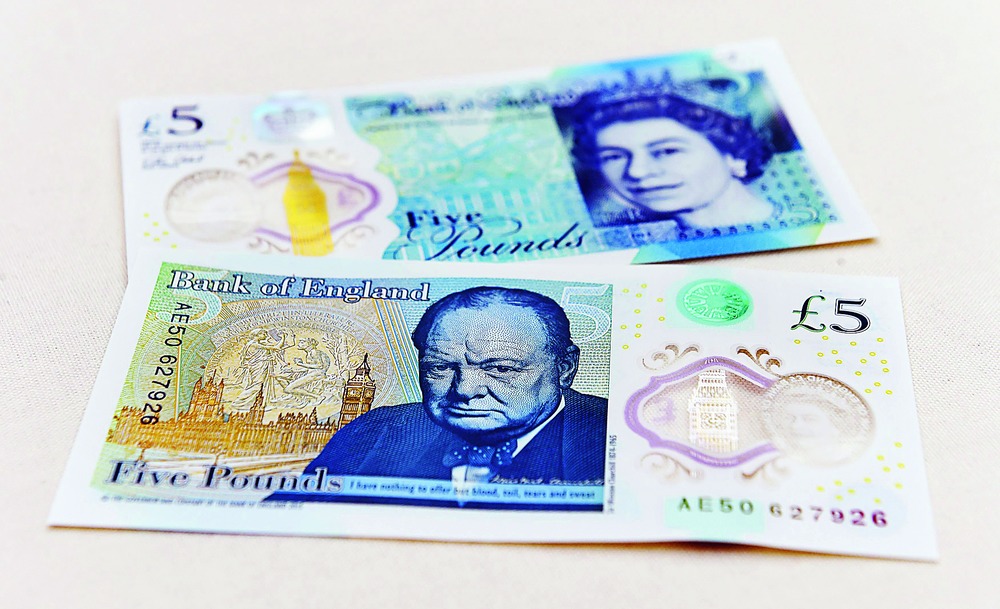London, Nov. 30: India's demonetisation crisis appears a little catching. Britain now has one too, with Hindus, vegans and others demanding the withdrawal of the new £5 note.
The Bank of England has confirmed that the note has traces of animal tallow, although it won't say whether the fat comes from beef or pork or, as is likely, both.

Trupti Patel, the first woman to be made president of the Hindu Forum of Britain, announced her organisation's opposition to the new notes in an interview with BBC World Service this morning.
She said that Hindu temples in Britain were already objecting to the new notes, introduced on September 13. Bank of England governor Mark Carney even dipped a new note in curry to show how durable it was.
There is not yet a rerun of what the British called the "Sepoy Mutiny of 1857" and Indians describe as "the first war of independence". The revolt was sparked by reports that the sepoys' Enfield rifle cartridges, which they were required to bite open, were greased with cow and pig fat - taboo for Hindus and Muslims.
British Hindus are now signing a petition started by a vegan, Doug Maw, who knows that if he can get to 100,000 signatories, Parliament is legally bound to discuss the issue. By lunchtime today he was up to 96,014 supporters.
His petition, to be delivered to the Bank of England, reads: "The new £5 notes contain animal fat in the form of tallow. This is unacceptable to millions of vegans, vegetarians, Hindus, Sikhs, Jains and others in the UK. We demand that you cease to use animal products in the production of currency that we have to use."
The trouble had begun when the Bank of England responded to a query on Twitter about the composition of the note.
"We can confirm that the polymer pellet from which the base substrate is made contains a trace of a substance known as tallow," it said.
"Tallow is derived from animal fats (suet) and is a substance that is also widely used in the manufacture of candles and soap," the bank said.
The new note is smaller than the one it is replacing but is made from plastic polymer and can survive "a splash of claret, a flick of cigar ash, the nip of a bulldog and even a spin in the washing machine", Carney, the Bank of England governor, said.
These notes are expected to last two-and-a-half times longer than their paper counterparts and, according to Carney, "can better withstand being repeatedly folded into wallets or scrunched up inside pockets".
The note features the Queen on one side, as always, and wartime leader Sir Winston Churchill on the other, along with his famous quote: "I have nothing to offer but blood, toil, tears and sweat."
A host of additional security features will make the notes harder to counterfeit, and the fiver's anticipated five-year life cycle will reduce the future costs of banknote production, the Bank of England said.
About 440 million of the polymer notes have been printed, and can be recycled into plastic products when they are withdrawn from circulation.
The use of thin, see-through polymer is a first for the Bank of England, which invested £70m in the project.
The launch follows several years of research, public consultation and preparation by Britain's central bank, which intends to launch a polymer £10 note in mid-2017 and a £20 version by 2020.
Social reformer Elizabeth Fry featured on the paper £5 note, leading to protests about its withdrawal because she was the only woman (apart from the Queen) to feature on British banknotes. Jane Austen, however, will feature on the new tenner and the artist J.M.W. Turner on the next £20 banknote, expected to enter circulation by 2020.
Fans of polymer banknotes argue they are cleaner and more durable than the paper version, less likely to distribute harmful bacteria and harder to counterfeit. Some respondents to a public consultation held in 2013 by the Bank of England complained they were too slippery, according to the central bank's website.
Victoria Cleland, the bank's chief cashier, whose signature is on the banknotes, insisted the fivers were "not that slippery - and when you fold them they will stay in your pocket".
Elena Orde of the Vegan Society said animal fat "doesn't need be used in the notes at all. Using animals in this way is outdated and unnecessary, not to mention the fact that it is obviously cruel".
Innovia, the producer of the new fiver, refused to answer any questions about the make-up of the notes or how the animal fat contained in them is produced.
Adding to the Twitter storm, Annie Walker @Thunderoad75 protested: "Confirmed by @bankofengland. So many implications, not just for vegans, but presumably some religious groups too."
This produced a wisecrack from Jay @BeardyManJay: "To all #vegans not liking the new £5 notes I'm offering an #exchange I will give u £1 for every new £5 u don't want."











